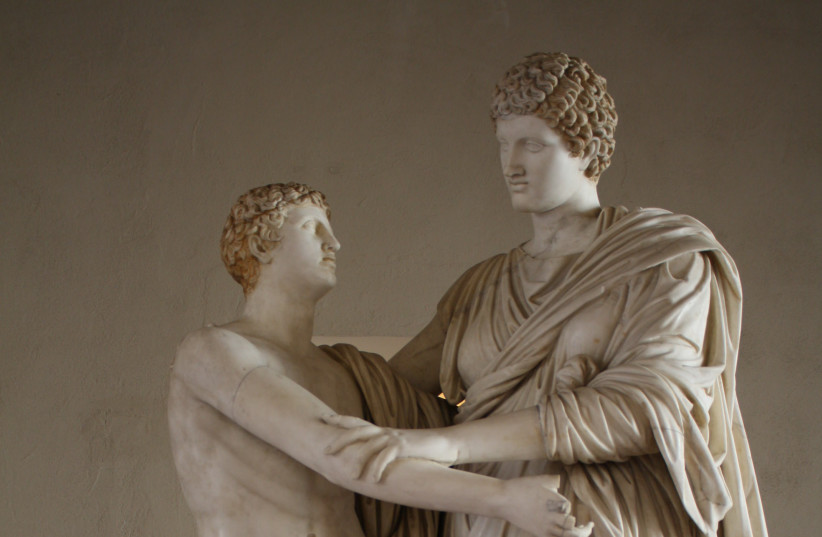A beautiful Greek-styled head, semi-sunk into the stage of the University Theater’s production of Electra by Euripides, towered above us.
A farmer (Amit Lasri) was working, lifting sacks of grain. His wife, Electra (Tal Shahar), sat on one, brooding. Her brother, Orestes (Rea Desheh), approached. The choir (Shiri Blustein, Noa Millo, Chen Kimhi Vardi), dressed in khaki, watched him as he walked. His shoes – like Electra’s – had white soles. All the others wore boots. Will she recognize her lost brother?
Translated by Shimon Buzaglo, Euripides’s Electra is about a cursed family. Agamemnon, the father of Electra and Orestes, is not around. He won the Trojan War, only to be slain in the bathtub by his wife, Clytemnestra (Hili Baruch Stern), and her lover, Aegisthus. They married Electra off to a farmer, and Orestes was smuggled out of the country by a loyal servant, now an old man (Amit Braverman).
Orestes eventually returns home to avenge his father. He can kill Aegisthus, but can he slay his own mother?
Buzaglo’s translation is easy to follow. “Such is the nature of servants,” the old man tells Orestes, “they always look for the side with butter on it.” When compared with how Ian Johnston translated the same line – “that’s what slaves are like” – one sees that ease has some costs.

In this adaptation by director Ilil Lev Kenaan, there are no prayers to “Lady Earth” to aid the siblings to reclaim their heritage. Much of what makes the Greeks interesting – meaning, not like us – was removed. What was gained is a streamlined, compact retelling that hits close to home.
When the old man flees, unable to see the violence done to Clytemnestra, he proves his own point. He, too, is a servant – his loyalty does not stretch to matricide.
Thanks to costume designer Tamar Glazer, the director reimagined the choir as three uniformed IDF soldiers who voice what society thinks. What was cut out in the text is given on stage. When Orestes questions whether Apollo could really instruct him to commit such a crime, or whether the instruction was a trick, they circle him and watch.
This gaze is a stage expression of the Greek concepts of aidos (shame), nemesis (to give what is due), and pheme (talk). Orestes feels shame because, while he wants to follow the command of Apollo, he also fears Nemesis will turn on him, and he will be hunted by the furies for murdering his mother. The people of Mycenae, the country he wants to rule, will talk against him, and he will lose any hope of ruling them as his father did. So what is the purpose of all this violence?
Characters in the play
Shahar is the extra hand to help him thrust that sword. Her Electra is surly. After her delightful role in Dea Loher’s The Last Fire – in which she played a cop so eager to catch a terrorist she became one – Shahar offers a gruff, powerful woman trapped in a loveless marriage and without hope. Her refusal to believe that Orestes is her brother, that Aegisthus is dead, is borderline insane.
Braverman also shows remarkable range after recently playing the role of Reynald of Chatillon in The King of Jerusalem by Gilad Evron. His soft-spoken, cowardly old man is a far cry from the athletic prince of Transjordan he inhabited on stage just a few months ago.
Lasri, who plays a character blessed with decency and common sense, is magnificent. As he walks on stage, planting seeds in neat piles, he represents all the people who put bread on the tables of kings and priests by the sweat of their brows as history is made above their heads and on their backs. When Lasri puts an end to his own gaze in a powerful scene, he expresses our own need not to see the horrors around us.
Baruch Stern is a regal Clytemnestra. The contrast between her white dress and the drabs her daughter wears tell us all we need in one glance.
Euripides, a daring playwright who challenged Greek norms – from the existence of the gods to telling the choir to be quiet (“Hush, aged citizens of Thebes, be silent,” in Herakles) – gives this impressive woman a voice against the whole world. She reminds Electra that her beloved dad murdered her older sister Iphigenia to win a war, and brought home a trophy second wife, Cassandra. While she talks, we can sense she has reasons. When Electra responds, we suspect it is not with her own voice, but that of the cold dead idol that failed her.
The point concerning Herakles was suggested by director Efim Rinenberg. Students alternate roles, with Kye Agin Peters as the servant, and Naama Geffen as Clytemnestra.
Electra by Euripides will be performed on Monday, March 4, Tuesday, March 5, and Wednesday, March 6. All performances are at 8 p.m. The University Theater at the Tel Aviv University Theater Arts Department, NIS 30-50 per ticket. Book tickets at https://bit.ly/tktstau/. Hebrew only. 90 minutes without intermission.
